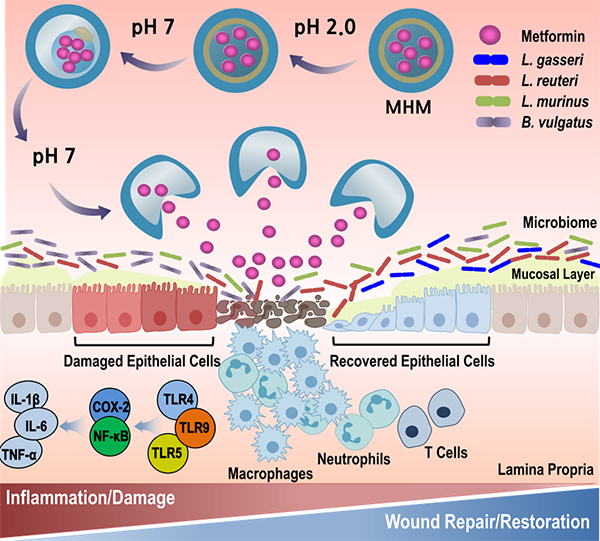연구/산학
PKNU Research 1000
| Se-Jung Lee | Developed Metformin-Based Treatment for Colitis | |||
| 작성자 | 대외협력과 | 작성일 | 2025-01-21 |
| 조회수 | 56 | ||
| Se-Jung Lee | Developed Metformin-Based Treatment for Colitis | |||||
 |
대외협력과 |  |
2025-01-21 |  |
56 |
Professor Se-Jung Lee's Team at Pukyong National University Developed Metformin-Based Treatment for Colitis


Pukyong National University (President Sang-Hoon Bae) announced that the research team led by Professor Se-Jung Lee from the Department of Smart Healthcare Convergence, Human Bio-Convergence Major, has developed an innovative metformin capsule effective in treating inflammatory bowel disease (IBD) and improving the gut microbiome.
Professor Se-Jung Lee collaborated with Professor Chang-Hyung Choi from Yeungnam University, and the joint research findings were published in January in the international journal Journal of Controlled Release (IF 10.5), which specializes in chemistry and pharmacology.
The research team developed an oral pH-responsive drug delivery system using microfluidic technology to encapsulate metformin, a well-known diabetes treatment, within a triple-layer hydrogel capsule. This capsule is designed to release metformin specifically in the colonic inflammation site (pH 7) while protecting the drug from degradation in the acidic gastric environment (pH 2). This approach significantly enhances the bioavailability of the drug at the target site, enabling effective treatment of inflammatory bowel disease (IBD) with lower doses. The study also revealed that metformin not only regulates the pro-inflammatory immune response mechanism in IBD animal models but also improves the diversity and richness of the gut microbiota.
Professor Se-Jung Lee explained, “Patients with inflammatory colitis often face dietary restrictions, which can impair nutrient absorption, disrupt glycemic control, and increase the risk of developing Type 2 diabetes. While metformin has garnered significant attention as an exceptional diabetes treatment, its potential as a colitis treatment remains largely unexplored. Moreover, its stability and bioavailability are often compromised due to degradation by gastric acid and digestive enzymes before reaching the intestinal tract, necessitating higher doses. This encapsulation technology addresses these limitations and represents a breakthrough in drug delivery.” He further emphasized, “Our findings highlight metformin’s novel pharmacological effects and its potential as a therapeutic option for microbiome modulation and the treatment of refractory colitis through microcapsulation technology.”
Additionally, Professor Lee shared his aspirations, stating, “Through the development of advanced microcapsules and microneedles, I aim to discover biopharmaceuticals, such as stem cells, peptides, and antibodies, capable of being specifically delivered to disease sites. This research will contribute to treating metabolic, chronic, and intractable diseases. I also hope to foster the next generation of talent in the field of smart healthcare.”